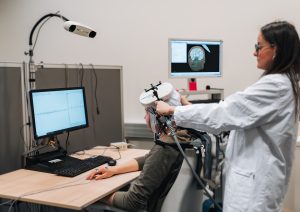The project at a glance
-
Start date:01 Sep 2020
-
Duration in months:54
-
Funding:University of Luxembourg
-
Principal Investigator(s):André SCHULZ
About
Communication between the brain and peripheral body organs is essential for health, stress or disease. The processing and perception of signals arising from peripheral organs, i.e. interoception, is mediated by the interoceptive brain network (IBN; e.g., anterior insula; anterior cingulate cortex; somatosensory cortices). A high functionality of the IBN is considered to be protective against stress and stress-related disorders, which are characterized by somatic symptoms. In the current study we aim at manipulating activity in the IBN. Transcranial magnetic stimulation (TMS) represents a method to enhance or inhibit the activity of brain regions. Repetitive theta burst TMS protocols targeting the brain tissue surrounding the anterior insula have been shown to inhibit activity in the IBN, as indicated by decreased interoceptive accuracy (IAc) in heartbeat perception and lower heartbeat-evoked potentials (HEPs) – brain potentials that are associated with the processing of heartbeats. Although protocols for enhancing activity of the IBN are yet unknown, it is likely that intermittent theta burst protocols (iTBS) are suitable for this purpose. Hence, the aims of the current project are: (1.) To establish a protocol to enhance the IBN using an iTBS protocol, which would be suggested by an increase of IAc and HEPs, (2.) to reveal if an activation of the IBN, using the iTBS protocol , reduces physiological responsiveness to acute stressors, as indicated by lower heart rate, blood pressure and cortisol increase, and (3.) to elucidate if an activation of the IBN reduces symptom distress in somatic symptom disorder. All iTBS protocols will be compared against a neutral stimulation protocol targeting a brain region irrelevant for the IBN and an inhibition protocol, which is expected to show opposite effects on IAc and HEPs. The current project has the potential to implement a new intervention technique to reduce stress responses and somatic symptom distress.
Organisation and Partners
- Department of Behavioural and Cognitive Sciences
- Faculty of Humanities, Education and Social Sciences (FHSE)
- Leibniz Institute for Resilience Research, Mainz
- Hôpitaux Robert Schuman, Luxembourg
Project team
-
André SCHULZ
-
Lisa LAI
-
Claus VÖGELE
-
Til Ole Bergmann
Leibniz Institute for Resilience Research, Mainz
-
Maike Aurich
Hôpitaux Robert Schuman, Luxembourg
Keywords
- Interoception
- Stress
- Somatic symptoms
- Brain stimulation
